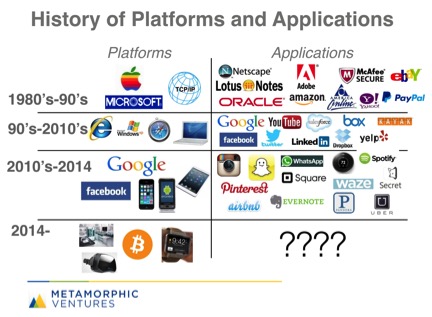David Hirsch
More posts from David Hirsch
Editor’s Note: David Hirsch is a founder of Metamorphic Ventures. The firm is an investor in TalkSpace, Boxbee, Snowball, Voyat and Thrive Market.
1) We Went From People Searching For Things To Things Finding People
Companies are leveraging data in order to serve people with relevant content, commerce, and ads based on situations and locations. In content, a good example of this is the rise of companies like Taboola and Outbrain, serving relevant content to users based on what they’re currently reading.
In commerce, look no further than Amazon where your experience logged into your account is vastly different than a logged-out experience. With their one-hour delivery anywhere in NYC, look for Amazon to leverage the smartphone’s capability in order to serve up more and more relevant commerce to people.
Uber is another company to watch in this space in 2015. As it continues to collect data about people, they’ll be able to offer rides in advance of when they know people need it the most by leveraging traffic and other data to make the service as efficient as possible. While Trunk Club and Stitch Fix match consumers with personal stylists to help pick out clothing that best suites them.
Your phone’s notification bar has also been at the forefront of this trend. Businesses can leverage your phone’s activity based on apps, pages viewed, and locations via technologies like iBeacon. Estimote is providing retailers with tools to leverage this capability. Snowball is a company building a social operating system that allows your messages to find you based on what is most relevant and contextual regardless of which app the sender is using.
This theme becomes even more important as we live a mobile-only lifestyle and people don’t use mobile to search like they did on desktop. Context matters more than ever.
2) The Smartphone Became A Remote For The Real World
In the past, what was once fixed Internet consumption based on where your desktop computer was or your hefty laptop has become ubiquitous Internet consumption via the smartphone. This has allowed a crop of new services where you use your phone to control aspects of the real world.
Examples of this trend are Uber and Lyft ( transportation and ride sharing), Boxed (home goods) Boxbee and Makespace (storage), Postmates (anything), Airbnb (excess capacity in people’s homes), HotelTonight (hotels), Doctor On Demand (doctors), Talkspace (therapy) , Washio (laundry and dry cleaning), Yplan (events), Munchery (dinner), Homejoy, Handybook, MyClean (home cleaning), TaskRabbit (everything), WunWun (everything), Zeel (massages) and Shyp (shipping).
Uber opened a massive market opportunity, which is transforming many major industries and making them far more efficient than they had been prior to the advent of the smartphone and the Internet.
3) New Platforms Were Born
For the first time in several years, we have multiple new platforms with exciting opportunities ahead to build applications on top of them. Whether it’s Blockchain technology, virtual reality, 3D printing, or the Internet of Things, there will be no shortage of innovative applications built on top of these platforms in 2015 and beyond.
History tells us that each time a new platform or technology emerges, valuable companies are built on top of them.

4) Virtual Reality Became More Than Just A Gaming Platform
I have to admit, when I first heard about Facebook buying Oculus for $2 billion I didn’t understand it. I realized the merits of virtual reality in gaming and know firsthand how big the gaming community is from my experience at IGN, but such a high price tag and from a company whose mission it is to “make the world more open and connected” just didn’t make very much sense to me. Then my friend and Metamorphic adviser Jane Rosenthal introduced me to Chris Milk who, along with Beck, created an immersive virtual reality live concert experience. It was amazing to sit outside this coffee shop in Venice Beach and feel as if I were at the concert.
My outlook on virtual reality changed completely. I now realize that it’s going to change so many industries. Stories will be told differently, sports will be viewed differently, and industries like education and real estate will use it as well. Imagine a world where kids can learn history by being totally immersed in it.
5) We Learned That The Next Smart Devices Won’t Be Phones
In a lot of ways, Google’s Nest acquisition showed the world that the Internet of Things is here to stay. There will be Internet-enabled devices in just about every category that will come online in the next few years. These devices show us that the next generation of web-enabled devices won’t be smartphones but rather a world where all of your devices are “smart” whether it’s wearables on your body or in your home or office.
The world of the Jetsons isn’t so far off anymore as more and more devices become connected and artificial intelligence technology continues to improve to the point where it can be used in products for consumers.
6) Personalization Became Universal
The logged-in vs. logged-out experience of Amazon has changed the expectations for personalization among users. While it used to be a luxury for consumers, now it’s simply expected. This is the human API, and companies are finding all sorts of ways to leverage our data to create an experience personalized just for us. If companies are sending promotional emails to customers with irrelevant offers and products, it’s likely that consumers will unsubscribe (or worse, report as spam).
Companies like Reserve have realized this in the offline world. When you use Reserve, the restaurant expects your arrival and the company handles all payments.
Voyat and SocialSign.in provide a personalized experience using your Wi-Fi and leveraging your social graph. By leveraging your preferences, these companies provide hotels, restaurants and other areas with valuable data they can use to ensure the guest has an incredible stay.
Ingredient 1 helps to provide your nutritional interest graph by showing foods and recipes based on dietary preferences and restrictions, as well as the stores that carry these products.
More and more companies will take note of this in 2015 as consumers expect the Amazon logged-in experience everywhere they go.
7) Content Became King Again
Whether it was BuzzFeed, Vice, Vox Media or Elite Daily, business models based on content are back and better than ever. A lot of this is attributed to the new “platisher” model, where it isn’t quite a publisher and isn’t quite a platform but both professional journalists and users are creating content under one umbrella.
This model provides for strong communities and brand for the content companies. Advertisers also like the branded content side of things where these professional journalists and users are creating content specially tailored for them.
Video content is also being consumed very differently. If I told you that PewDiePie, a video game player and commentator on YouTube has more than double the YouTube subscribers than Rihanna would you believe me? People are consuming content differently than ever before.
This is the world we live in today, where the League of Legend Gaming World Championship in the Staple Center had 32,000,000 viewers and the World Series in 2013 had 15 million viewers. Spanish Comedian Hola Soy German has 17 million people who watch his videos while the Breaking Bad series finale had just over 10 million viewers. Michelle Phan, a makeup artist on YouTube, has over 7 million people watching her videos, while Derek Jeter’s final home game had just over 2 million live viewers.
There is no separation between church and state in content anymore; consumption is happening from all over the globe and great creators can come from anywhere and build up massive audiences.
8) Urbanization Returned To The U.S.
In 2013, 2.3 million more people moved into metro areas than in 2012, driven by the demands of America’s two most powerful demographics. Baby boomers are retiring and moving back to the cities they left when they started families, and millennials want to live closer to each other and where the action is. This has provided a massive opportunity for businesses to be built that leverage the space and time constraints of urban areas.
9) Mindfulness And Nutrition Were More Prevalent Than Ever
2014 really was the year that mindfulness became mainstream. The Seattle Seahawks were meditating prior to the Super Bowl and companies are being created like Headspace, which helps to teach people to meditate and in turn clear their mind.
Not only do we try to incorporate fitness and mindfulness into the culture at Metamorphic with our founders and our team, but we added Eddie Stern as a formal adviser who meditates with us and teaches meditation and yoga to our portfolio companies. I recently joined the board of the Sonima Foundation, which is bringing mindfulness into public schools. We have lots of work to do, so you’ll be hearing from me in 2015.
Nutrition has also really reached the masses in 2014. Whether it was the movie Fed Up, or companies like Good Eggs and Hampton Creek raising large rounds of funding and continuing to grow, the public seems to finally have taken note of what we’re doing to our bodies by eating the processed food that’s a staple of the American diet.
Other companies like Thrive Market and Fresh Nation aim to democratize healthy eating by bringing organic and healthy foods to the masses. Thrive Market provides healthy foods at lower price points while Fresh Nation helps to make the farmers market experience ubiquitous. In 2015, I’m hoping that there will finally be some legislation like there is around Tobacco around processed sugars as well.
10) Gender Inequality In Tech Finally Got More Attention
It seems like in 2014, we’ve finally begun to address tech’s gender inequality problem. When I got involved with Girls Who Code a few years ago, there was a problem deeper than just female engineers not being hired by large tech companies. The problem was that there really weren’t a lot of female engineers. And it starts earlier as women haven’t traditionally been empowered to become engineers. Girls Who Code is doing a great job of changing this.
Debbie Sterling is also working to change this through her company Goldieblox, which uses toys and games to help give girls confidence in problem solving and engineering from a young age.































Comment